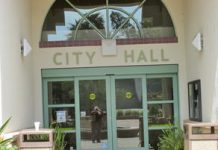First in a two-part series.
During the most recent election, perhaps one of the most passionate issues was the Island Company, and, more specifically, their management of and participation in major issues related to administration of island affairs.
Santa Catalina Island Company CEO Randy Herrel has been associated with the island for more than a decade now, and other than taking heated exception to a political flyer critical of the Island Company, he largely stayed out of the political fray.
Not lost on the Island Company, however, are the feelings that have evolved in recent years by some on the island who feel promises made by the Island Company have been ignored.
In an interview conducted before the political flyer was conceived, Herrel was clear about where he thinks the problems are centered.
According to Herrel, the relationship between the general population and the Island Company were generally pretty good until a few years ago, when “they got worse. A lot worse,” he said.
Herrel said when he first came to the island, community engagement created a “more positive” relationship and, for the most part, stayed that way until the recent deviation.
“There are small, vocal minorities,” that seize upon fear and negative sentiment to drive wedges in the population, said Herrel.
“They are ripping apart the (social) fabric of the community,” the CEO cautioned.
The Island Company was founded more than 120 years ago with a specific mission, said Herrel.
His job as CEO is to oversee the management of Wrigley’s legacy and manage the business affairs of a company dedicated to showcase island tourism while protecting one of the most pristine protected areas remaining on earth.
Also, the Island Company is interested in business activities that, in some way, contribute to their overall vision.
Having said that, however, Herrel said the Island Company is also interested in helping the island enhance its overall quality of life, both for Island Company employees and those who are not associated with the company.
“We give to most every legitimate fundraiser, we never say no to a fundraiser for a farewell or family member and we contribute to many local causes,” he said.
Moreover, Herrel said the company’s management team has adopted a strong reinvestment plan that puts most of their earnings back into the island.
It makes sense to get along, and Herrel is clearly hoping to find a way back to better relations with islanders and its government.
“We wish we could help more, and could, if people would positively and professionally work with us,” he said.
Complicating issues even further is the small amount of land available for development.
Most of the available land for development is owned by the Island Company, leading to additional frustrations with their decision making regarding its use.
Herrel said the Island Company does have stringent standards for development since such a small area remains for development.
“If the Wrigleys (and the successors) had said yes to every request for land, there would be none available today.”
The management team vigorously investigates every request made to the island company, said Herrel, adding that they are open to ideas. “We never say no to a meeting.”
Once in the door, prospective businesses have to prove to the board that they indeed have the money to build, the money to sustain, a viable business model and the proper experience and documentation to run a business.
Once those goals are met, he said, only then will the company’s board seriously consider a request.
But when the conditions are met, said Herrel, the Island Company will act accordingly. The new Von’s Supermarket under construction is one of the more recent examples of that, he said.
As far as the Island Company itself, Herrel says their willingness to be open with the community is perhaps partly responsible for some of the misconceptions about the company and intentions.
For instance, he acknowledged the Island Company did present “ideas” to the community years ago about a “resort style pool that would be open to the public, building new homes, a location for a community center and another soccer field,” etc.
Those were “ideas, not plans,” he said, recalling having presented them to the community as a vision for the future. “Our mistake may have been telling the community about ideas that could not come true (because of circumstances soon to befall the entire state).”
Shortly after the ideas were presented to the community, Herrel said California began to suffer from a “drought” which rationed water and effectively shut down any development hopes whatsoever.
He said the “emergency water situation” prevented any significant development then (and now). Some residents obviously interpreted the earlier vision as “promises,” said Herrel, and the lack of overall development, coupled with the factional splits, made a bad situation even worse.
“We are willing to sit around the table to help non-island company people as well as our own,” said Herrel, “but there is a vocal minority who may not believe in that,” he added. “This needs to go away for the sake of the kids and the future of the island’s residents.”
“Are we interested in facilitating a better quality of life for everyone on the island? Absolutely we are…and we should,” he added.
Next week: We will continue our conversation with Randy Herrel to learn what they are doing to accelerate development as he explains their five-year plan and what the Island company is doing to resolve the water situation on the island.











